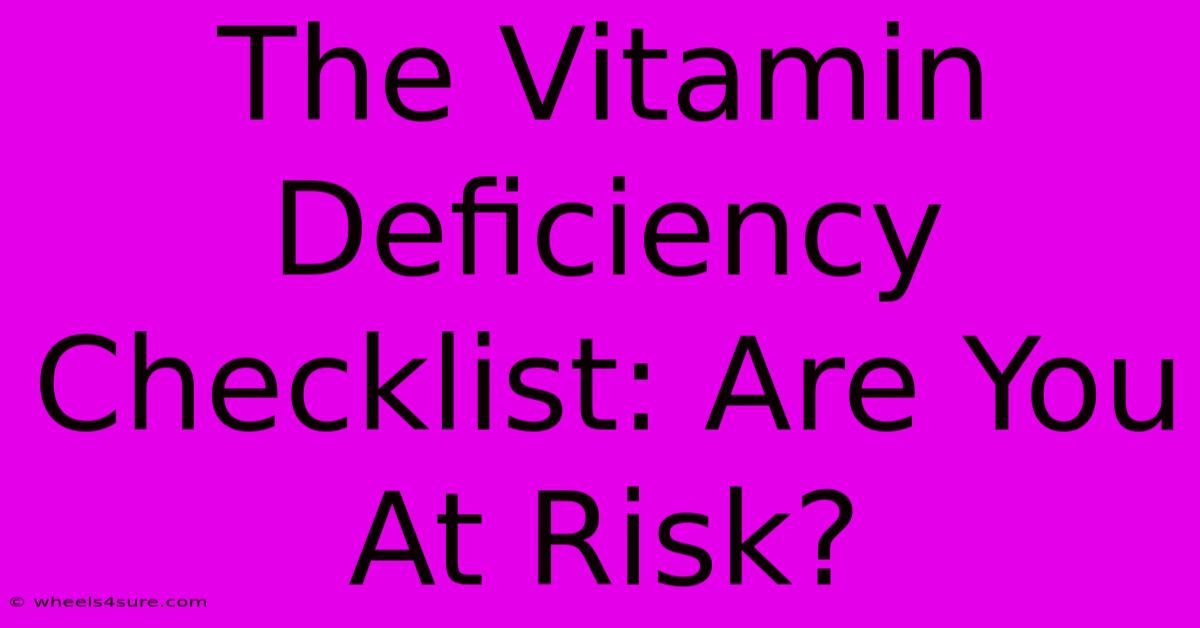The Vitamin Deficiency Checklist: Are You At Risk?

Table of Contents
The Vitamin Deficiency Checklist: Are You At Risk?
Are you feeling constantly tired, experiencing unexplained aches and pains, or noticing changes in your skin and hair? These could be signs of a vitamin deficiency. While many associate vitamin deficiencies with developing countries, they are surprisingly common even in developed nations. This checklist will help you assess your risk and understand the importance of maintaining optimal vitamin levels.
Understanding Vitamin Deficiencies
Vitamin deficiencies occur when your body doesn't get enough of a particular vitamin through diet or supplements. This can lead to a wide range of health problems, depending on the vitamin in question. Some vitamins are fat-soluble (A, D, E, and K), meaning they're stored in your body's fat tissue, while others are water-soluble (B vitamins and C), meaning excess is excreted in urine. This impacts how quickly deficiencies can develop and their severity.
Common Vitamin Deficiencies and Their Symptoms:
1. Vitamin D Deficiency: Often called the "sunshine vitamin," Vitamin D is crucial for bone health, immune function, and mood regulation. Symptoms can include fatigue, muscle weakness, bone pain, and increased susceptibility to infections. Who's at risk? People with limited sun exposure, older adults, individuals with darker skin, and those with certain medical conditions.
2. Vitamin B12 Deficiency: Essential for nerve function, red blood cell production, and DNA synthesis. Symptoms can range from fatigue and weakness to numbness, tingling, and cognitive impairment. Who's at risk? Vegans and vegetarians (B12 is primarily found in animal products), older adults (reduced absorption), and individuals with conditions affecting nutrient absorption.
3. Vitamin A Deficiency: Important for vision, immune function, and cell growth. Symptoms include night blindness, dry eyes, dry skin, and impaired immune function. Who's at risk? People with poor diets lacking fruits and vegetables, individuals with fat malabsorption issues, and those with certain liver conditions.
4. Iron Deficiency: While not strictly a vitamin, iron deficiency is a common nutritional deficiency leading to anemia. Symptoms include fatigue, weakness, pale skin, shortness of breath, and dizziness. Who's at risk? Women of childbearing age, pregnant women, vegetarians, and individuals with heavy menstrual bleeding.
5. Vitamin C Deficiency (Scurvy): Though rare in developed countries, severe vitamin C deficiency leads to scurvy, characterized by fatigue, weakness, gum disease, and easy bruising. Who's at risk? Individuals with poor diets lacking fruits and vegetables, smokers, and those with chronic conditions affecting absorption.
The Vitamin Deficiency Risk Checklist:
Answering "yes" to several of these questions might indicate a need to consult your doctor for testing and guidance.
- Do you frequently experience unexplained fatigue or weakness?
- Do you have frequent muscle aches or pains?
- Do you suffer from brittle nails or hair loss?
- Do you have poor wound healing?
- Do you experience tingling or numbness in your extremities?
- Do you have problems with your vision, such as night blindness?
- Do you follow a restrictive diet (vegan, vegetarian, etc.)?
- Do you have a medical condition that affects nutrient absorption?
- Are you pregnant or breastfeeding?
- Are you older than 65 years of age?
- Do you have limited sun exposure?
- Do you have a family history of vitamin deficiencies?
What to Do If You're Concerned:
If you've answered "yes" to several of the questions above, it's crucial to consult your doctor. They can conduct blood tests to determine if you have any vitamin deficiencies. Self-treating vitamin deficiencies can be dangerous, so professional guidance is essential. Your doctor can recommend appropriate treatment, including dietary changes or supplementation, based on your specific needs.
Remember, a balanced diet rich in fruits, vegetables, whole grains, and lean protein is the best way to prevent vitamin deficiencies. However, individual needs vary, and sometimes supplementation is necessary. Prioritizing your health and seeking professional advice when needed is key to maintaining optimal vitamin levels and overall well-being.

Thank you for visiting our website wich cover about The Vitamin Deficiency Checklist: Are You At Risk?. We hope the information provided has been useful to you. Feel free to contact us if you have any questions or need further assistance. See you next time and dont miss to bookmark.
Featured Posts
-
Uzak Sehir The Final Episode Watch Now You Tube Link Inside
Apr 06, 2025
-
Perry Chois Net Worth A Financial Profile
Apr 06, 2025
-
Perry Choi A Net Worth Story Of Perseverance
Apr 06, 2025
-
Angela Torres Parents Their Untold Story
Apr 06, 2025
-
The Secret To Alysha Burneys Youthful Age
Apr 06, 2025
